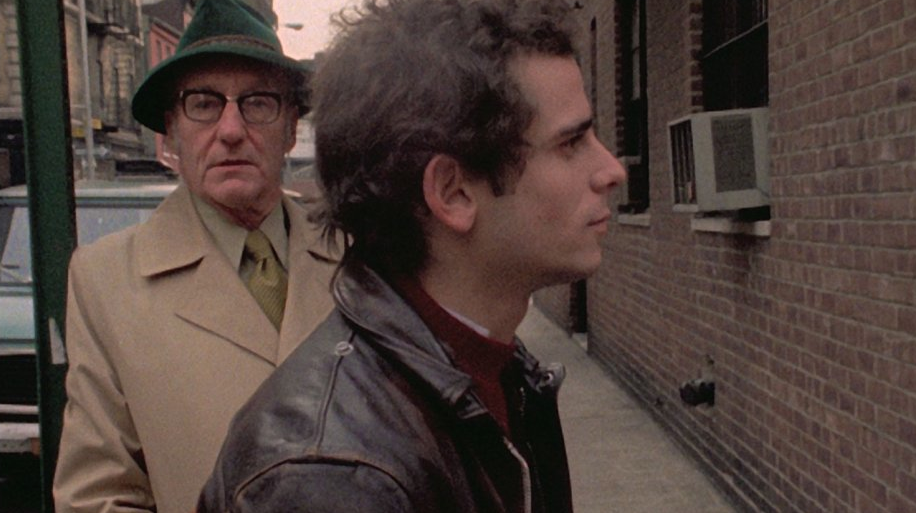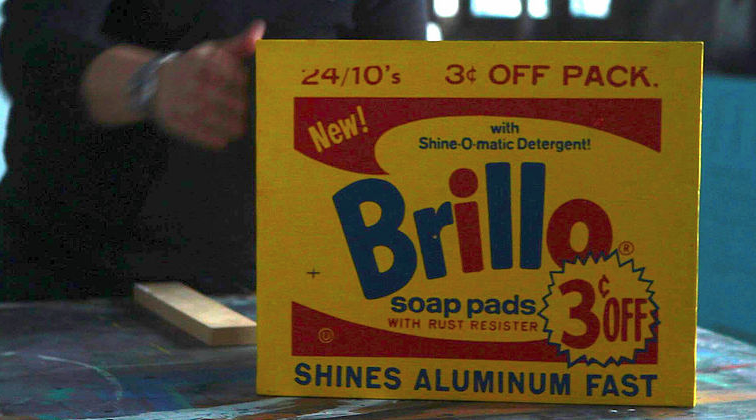NYFF: Uncle Howard & Brillo Box (3 ¢ off)
 Thursday, October 6, 2016 at 10:40AM
Thursday, October 6, 2016 at 10:40AM Here's Jason reporting from NYFF on two docs that deal with a younger generation being affected and influenced by the art dealings of their elders.

It seems like every other gay person that I meet has a gay aunt or uncle who informed their childhood in some way - I never did; the closest I got was a friend of my mother's who was whispered about as a weird bachelor type, but he was out of her life before I was born. But you remember such things, small weird whispers as they are, when they're your singular life-line to a big world actually existing out there where you can figure your own stuff out.
I don't know or care if director Aaron Brookner is gay himself but you get the same sensation from watching Uncle Howard, his new documentary on his uncle, a film-maker who died at the age of 34 from AIDS - the thirst to eat up all he can about this fabulous person who lived a fabulous life in the margins of his own, and what that was like for him...
Perhaps it's the film-making angle that captured Little Aaron's imagination - it wouldn't seem a stretch since it turns out Brookner has extremely good cause to turn the cameras on for his uncle and all he accomplished. Not many of our gay uncles or Mom's Mysterious Gay Friends From The Past spent years hanging out with William Burroughs or filming Madonna singing on a gigantic swing, and have the footage to prove it. Howard Brookner directed three films in his short life but it seems like he always had a camera on - he was an incredibly early adopter of our current capture-anything-no-matter-how-mundane ethos; I can only imagine how expensive such a habit was in the age of film-reels and video-cassettes.
But thank goodness he managed. Uncle Howard carries us right back into Howard's fascinating world, living and making art in the 70s and 80s in New York - we openly hear Aaron express awe over footage of some of the street scenes (the Bowery outside of Burroughs apartment!) and we're right there with him. It's a literal time-capsule, and eventually quite an emotional one at that, as we watch the city and the art scene that Howard's so enmeshed in crumble around him. There's a fair bit of deservedly righteous anger and a palpable sense of loss, for all the art we will never have as AIDS cut through an entire generation. Where would this Howard have gone? What would all of the Howards have done? As a lifting of that torch Uncle Howard is vital.

In 1964 Andy Warhol caused a bit of a stir, at least among those who stirred when Art was poked at with a stick, when he did a show at the Stable Gallery in Manhattan where he filled the entire space with replicas of commercial cartons. His idea was to make it look like the backroom of a grocery store, and that he did - piled high were crisp clean and bright (poppy, you might even call them) recreations of Kellogg's corn flakes, Brillo soap pads, Mott's apple juice, Del Monte peaches and Heinz ketchup boxes. The headlines were swift and immediate: WTF Andy?
Well a few people got WTF Andy was up to at the time, and one set of those people were the parents of Lisanne Skylar, whose vague childhood recollections of the yellow Brillo Box that sat in her living-room once upon a time have been turned into the curious and fascinating new documentary short Brillo Box (3 ¢ off), which tells the story of the Pop Object through the lens of one family's lost love of art.
Focusing in on one single important piece like this is a bit of a master-stroke - it allows us to survey the scene of the 1960s art-world in miniature, and from there to watch how it drifts through the stratospheric commodification of said culture over the course of the following decades. How does the small time lover of art fare as the prices go from swapping on the streets of New York to a thousand clients around the world screaming into telephones at Christies Auction House?
There's a sadness that envelopes the film, a real feeling of loss for the tangible hands-on living art that once was. Skylar's parents surprisingly seem less irritated about any monetary losses they might've had (they only kept the box for a short while) and more concerned with the charm of the object itself, and the personality of it that momentarily invaded their lives - the sense memories that it evokes.
And it's not lost on the film that Andy Warhol's ability to turn a box carton or a can of soup into a something more, something separate, a product out of the hands of the majority for the minority, helped to steer us into that direction. I mean if something that once literally carried scrubbing pads to grocery chains around the country is now buried beneath plexiglass and sold to the highest bidder, how do we even commune with beauty itself in this new world order?
Brillo Box (3 ¢ off) screened at the NYFF earlier this week and it will premiere on HBO sometime in 2017.
 Brillo Box,
Brillo Box,  LGBT,
LGBT,  NYFF,
NYFF,  Reviews,
Reviews,  Uncle Howard,
Uncle Howard,  documentaries,
documentaries,  film festivals
film festivals 


Reader Comments (1)
Great stuff.